简体中文
繁體中文
English
Pусский
日本語
ภาษาไทย
Tiếng Việt
Bahasa Indonesia
Español
हिन्दी
Filippiiniläinen
Français
Deutsch
Português
Türkçe
한국어
العربية
BitMex Co-Founders Plead Guilty to Breaking U.S Bank Secrecy Act
Abstract:Last year, BitMEX paid a $100m penalty for breaching U.S laws. This week, co-founders Delo and Hayes each paid $10m after pleading guilty overnight.

BitMEX co-founders Delo and Hayes plead guilty to violating the Bank Secrecy Act
In 2021, crypto derivatives trading platform BitMEX paid a $100m penalty for breaches of U.S laws
Increased regulatory scrutiny will likely see more hefty fines on the horizon
Co-founders Arthur Hayes, Ben Delo, and Samuel Reed established BitMEX, a P2P crypto trading platform in 2014. The platform supports crypto derivatives trading, including futures and margin trading.
BitMEX Co-Founders Plead Guilty
Overnight, the U.S Department of Justice announced that BitMEX co-founders Delo and Hayes have pleaded guilty to violating the US Bank Secrecy Act. “Hayes and Delo each agreed to pay a $10 million criminal fine representing pecuniary gain derived from the offense.”
In 2020, co-founders Hayes, Delo, and Reed were accused of operating an unregistered trading platform. The Commodities Futures Trading Commission (CFTC) accused Hayes, Delo, and Reed of violating CFTC rules reportedly that included anti-money laundering and KYC regulations.
For evading anti-money laundering requirements, co-founders Hayes, Delo, and Reed, as well as Greg Dwyer (head of business development), were also charged with violating the Bank Secrecy Act.
BitMEX Pays $100m Penalty
In August 2021, U.S federal courts entered a consent order against 5 companies charged with operating the BitMEX crypto derivatives trading platform.
The order required the five entities to pay a $100m penalty in addition to prohibiting BitMEX from further violations of the Commodity Exchange Act (CEA) and CFTCs regulations.
According to the order, BitMex operated as a common enterprise from at least November 2014 to October 2020. The platform reportedly offered leveraged trading of crypto derivatives to retail and institutional clients. BitMEX was aware of U.S customer access to the platform.
In the U.S, BitMEX violated rules under the CEA by enabling the trading or processing of swaps without approval as a Designated Contract Market (DCM) or a Swap Execution Facility (SEF).
Regulatory Scrutiny Keeps Exchanges in Focus
Since late last year, regulators have increased scrutiny of the crypto market. This month BlockFi paid a $100m penalty in an SEC settlement. In November 2021, the SEC alleged that BlockFis high-yielding accounts were unregistered securities.
While the conclusion to the BlockFi case was swift, the SEC v Ripple Lab (XRP) case has been ongoing since late 2020.
Other exchanges that have recently faced U.S regulatory scrutiny include Coinbase (COIN) and Binance (BNB).

Disclaimer:
The views in this article only represent the author's personal views, and do not constitute investment advice on this platform. This platform does not guarantee the accuracy, completeness and timeliness of the information in the article, and will not be liable for any loss caused by the use of or reliance on the information in the article.
Read more

Blockchain Decentralization: Empowering a Trustless Future
In recent years, blockchain technology has rapidly evolved from a niche innovation behind Bitcoin into a transformative force across industries. At its core, blockchain decentralization refers to the distribution of authority and decision-making away from a central entity and into the hands of a distributed network of participants. This shift redefines how data is stored and verified and paves the way for trustless, transparent, and resilient systems that challenge traditional centralized models.

The president of @Liberland, @Vít Jedlička come on stage, dialogue on trading security.
The 2025 WikiEXPO Hong Kong Station is about to grandly open. the president of @Liberland, @Vít Jedlička come on stage, dialogue on trading security.

Countdown: 1 day.WikiEXPO2025's first stop, Hong Kong, is about to open.
⏰ Countdown: 1 day. WikiEXPO2025's first stop, Hong Kong, is just tomorrow. Focus on transaction security and explore new investment opportunities. ???? Get ready to start now. See you tomorrow.

JustForex vs JustMarkets: A Comprehensive Comparison in 2025
Selecting the right forex broker can make the difference between trading success and frustration for most investors, especially retail investors. As retail traders gain unprecedented access to global markets, the choice between platforms like JustForex and JustMarkets becomes increasingly significant. Both brokers offer some shining features within the forex and CFD trading space, but their approaches differ in some areas.
WikiFX Broker
Latest News
The Withdrawal Trap: How Scam Brokers Lure Victims into Paying More
FCA to Investors: Think Twice Before Trusting These Brokers
Trump\s tariffs: How could they affect the UK and your money
Trump gambles it all on global tariffs he\s wanted for decades
TradingView Brings Live Market Charts to Telegram Users with New Mini App
Trump tariffs: How will India navigate a world on the brink of a trade war?
Interactive Brokers Launches Forecast Contracts in Canada for Market Predictions
Authorities Alert: MAS Impersonation Scam Hits Singapore
Stocks fall again as Trump tariff jitters continue
IG Group Acquires Freetrade for £160M to Expand UK Investment Market
Currency Calculator







